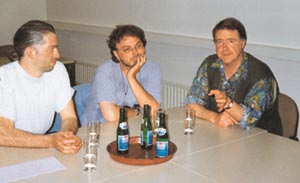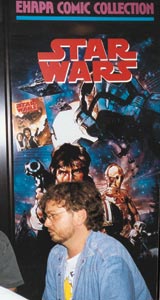 Question:
What's so fascinating about Star Wars?
Question:
What's so fascinating about Star Wars?
 Question:
What's so fascinating about Star Wars?
Question:
What's so fascinating about Star Wars?
Cam: Star Wars was very unique the first time it started. Something like that had never been done before. The people were real "shocked", when the huge Stardestroyer came flying over your head with no zipper on it, not shaking, no wires. They looked at it and said: "It's real!" The specialeffects reached a quality, that hadn't been seen before. Maybe with the exception of 2001 from Stanley Kubrik.
Q: Fred and Oliver, what were your impressions, when you first saw Star Wars in the cinema?
Oliver: It was overwhelming. Before this kind of science fiction existed only in the literature. Now you could experience it with your own eyes on the screen. Like Cam said before, Star Wars was the first film, that reached this quality. When Dark Horse offerd me the chance to draw Heir to the empire, I accepted instandly.
Fred: I was very young when Star Wars started. I didn't saw the movie. I also wasn't allowed to watch TV. All my friend in school talked about it, what it was like. This was pretty frustrating. I drew the movie the way I imagined it myself. Later, when I saw Star Wars , it was like a door gets pushed open.
Q: Star Wars was a phenomena. What was the biggest challenge to transform it into the comic media?
Cam: Well, I didn't think I "transformed" the movie into a comic. I wanted to capture the atmosphere first of all. So, that's why I went for blue and greens. The people at Lucasfilm said, the colors a more like cinematic colors. I got a very good feedback, when the first series of Dark Empire came out. The people said, it's like the movie. It's all trick, all bluff, you see.
Q: What was the most difficult thing, when you worked on Dark Empire?
Cam: Honest answer?... to draw R2-D2. I don't like him anymore, because he was so difficult. He's one of those figures, that needs a lot of attention. It's easy to draw an image of R2. But the real Star Wars-buffs look closely and say: "Ah, ah, there're two panels missing!" That was really difficult. But the rest was easy. After Tom Veitch and me decided to make Dark Empire, I didn't knew much about Star Wars. For me it was just an old movie. I watched the three movies and got hold of some referencebooks with pictures of the Millennium Falcon and various other people. I worked from there and plunge headlong. And it worked out nice. So people tell me.
Q: Can you descripe your first contact to Lucasfilm?
Oliver: We were invited from Dark Horse to sign the contracts. That was also the oppotunity to visite the Skywalker Ranch. We weren't like professionals there, but more like fans. Like children in Disneyland- Lucasland. This was something like a dream came true. Lucy Wilson, who was responsible for the contracts showed us around. It's a ritual, that every visitor greets Yoda. We were thrilled, when we cursory glanced George Lucas through a window. Everything was very exciting. But we didn't met George Lucas personally.
Q: Did you met George Lucas personally, Cam?

Cam: No, I also was invited to the Skywalker Ranch. He was there,
but in a meeting. It didn't cause me sleepless nights not to have met George
Lucas personally. But he sent me each year a christmascard!
Q: What are your origins as an artist? Where did your love of comics generate?
Cam: When I needed money. I never had any intention working in comics. I started off as a commercial artist, then I was a poet, lived in Paris and was painting then- "proper art". After my divorce I came back to Scotland. Somebody suggested to try these things called "comics". I had read comics when I was younger, like Tom & Jerry. I never thought of comics. That's all. Anyway, I sent 4 or 5 pages of sketches to a publisher in London and they sent me back a script. I had no idea how a comic was made! I just put it on the paper, what I thought was right and they loved it. The rest is history. I'm very mercenary about it. I can draw very easily and they pay me a lot of money for doing it. I can take days off, when I want. That's it. I can't tell you all the origins of superheroes, because they're only grown ups in underwear for me.
Fred: I was in a school, that teached design and advertising. But I didn't liked this. Then I made illustrations for various publishers. After I met Oliver, we started working together. But I couldn't draw comics all the time. This is too lonesome. You are sitting one year at home alone and working on an album. You don't know, if the people will like it or if you get paid for it. You don't get any feedback. I love to work for animation films. It's a teamwork. Everybody bring in something. You meet a lot of people, who are also very talented and you can learn from each other. I like to work with Oliver, but I don't want to do only comics.
Q: What do you thing, how the movie-industry treat comic-characters on screen?
Cam: Unfortunately, what Hollywood tend to do, when they want to take comic-strip characters on the screen is, they never use the people, who worked with this character for years and years and are confident with it. One reason seems to be the "American Screenwriters Guild", it's kind of a union. They have to go and find an other guy, who never read about this character to do the screenplay. Hollywood-people belive they're far more creative, than anybody else. When John Wagner- who's a scotsman- created Judge Dredd, he imagined him as a 2,40m clone. Hollywood in his wisedom, hired Sylvester Stallone, a 1,67m italo-american. Why didn't they look for a 2,20m basketballplayer? Judge Dredd became a cult-figure, a superhero and nobody never, ever saw his face in all the years. This is pretty unique and clever. I drew him myself for years. But Hollywood says no, we get some big star to play Judge Dredd and take off his helmet. This isn't Judge Dredd anymore for me. Why change something, that is established? A fat movieboss with a big cigar sitting in a Hollywood-office and says:" Change everything!" Why? Of course, it also has to do with US-Dollars. I'm always very wary with all Hollywood-adaptions of comic-strips.
Oliver: I think, the first two Superman-movies were successful and Batman, concerning the design and atmosphere.
Q: Can you imagine working on the Prequels? On the storyboards, productiondesign or in the merchandisingsector?
All three: No! (laugher)
Cam: Somebody at Lucasfilm has said, we can ask Cam Kennedy for some bounty-hunters and ships. But nobody spoke to me. Somebody else said, no, I don't think so, because he would be insulted in how little money he would be offered. Being scotish, you like to hear about money. Even if you don't accept it. You know, what Lucasfilm asking creative people to do, is to put the best ideas on paper for costumes and machinery. Things, that eventually can be made into toys and videogames. But the payment you get from Lucasfilm is one payment, no royalties. In 15 years, when a spaceship or figure you designed just sold over $5 billion, then you cry, because you gave it all away. I find plenty of people to do so, because for a lot of people it would be a great honour to work for George Lucas. George Lucas is just a man, no big god or anything. I don't fall for that trap idolising George Lucas.That's why I don't work for Lucasfilm. Don't get me wrong. Lucas respectively Dark Horse really got good stuff from me. But the spaceships I like, the costumes I like, the characters I like, they belong to me. It doesn't say copyright George Lucas, it says copyright Cam Kennedy.
Oliver: In the beginning we worked like fans. Gave the best, as an homage to that, what we have seen as boys. But later, we came to the conclusion, that George Lucas killed Star Wars himself with the Ewoks in Return of the Jedi and the commercial exploitation. At the end, we had the impression working for Disney.
Q: You wouldn't do it again?
Oliver: No.
Cam: Sad statement.
Fred: We've become wiser.
Oliver: We had to work very fast, produce a lot and couldn't work as qualitative as we originally planned it.
Q: Did you had any guidelines of what is allowed and what is prohibited?
Cam: Like a shaved Chewbacca? No, you just was told, here're the characters. They have to stay that way. But it didn't came into my mind to change something. It was just a job.
Oliver: It was different with us, because we had to adapt a novel and had to use a roleplaygame as a reference. Lucasfilm was very open. Restrictions came more from Dark Horse.
Q: Many american fans dislike the Nogris, because they didn't correspond to the novel.
Oliver: The Nogris were discript in the book, but the illustration in the roleplaybook was poor. We weren't happy about that. It just wouldn't work in a comicstory. We improved them. We kept the head, but lenghend the body. The fans didn't accepted it at all. But because Lucasfilm granted the change, the fans calmed down again.
Thank you for this interesting interview and until in a galaxy far, far away.